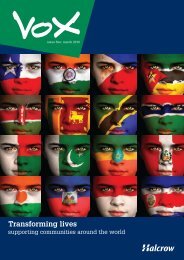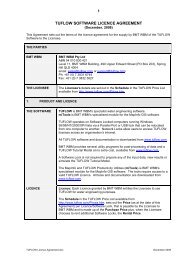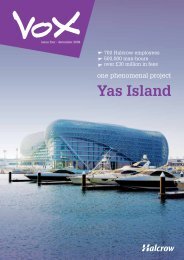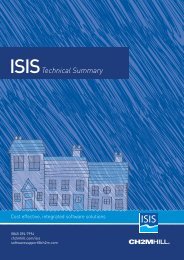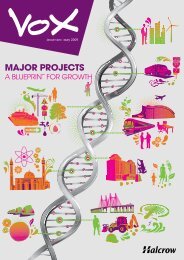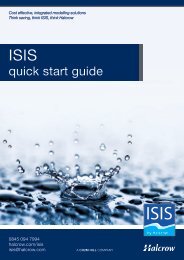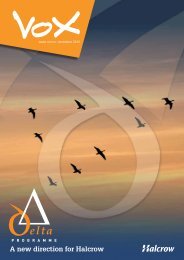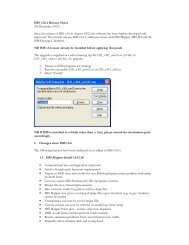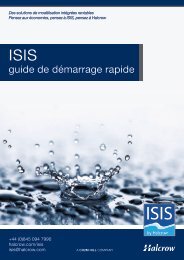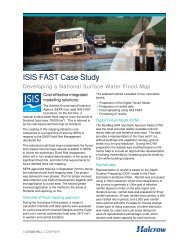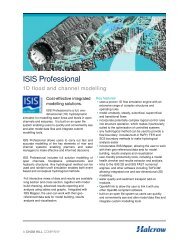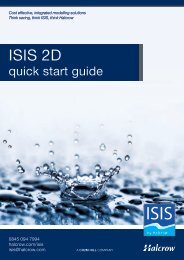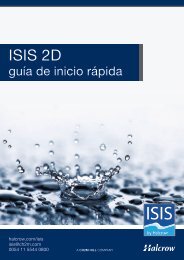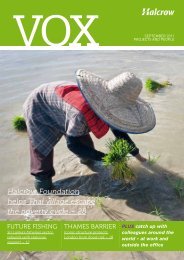December 2008 - Halcrow
December 2008 - Halcrow
December 2008 - Halcrow
Create successful ePaper yourself
Turn your PDF publications into a flip-book with our unique Google optimized e-Paper software.
eople hobble down the mud tracks<br />
P<br />
dissecting the Naivasha slum in<br />
Kenya’s Rift Valley on spindly,<br />
malformed legs that buckle under their<br />
weight – evidence of excessive fluoride in<br />
the region’s water. Other symptoms include<br />
mottled tooth enamel and warped bone<br />
joints, causing sufferers considerable<br />
pain and discomfort.<br />
In February, Water and Sanitation for the<br />
Urban Poor (WSUP) – a not-for-profit<br />
organisation of which <strong>Halcrow</strong> is a founding<br />
member – launched a project to reduce<br />
fluoride levels in the drinking water to<br />
internationally-recognised safety standards.<br />
Given the lack of established infrastructure<br />
and prohibitive maintenance costs, the<br />
fluoride removal processing plant had to tick<br />
price, simplicity and sustainability boxes, in<br />
addition to fulfilling mandatory performance<br />
requirements.<br />
Intended to eventually provide water,<br />
sanitation and hygiene services for 600,000<br />
residents of the Mirera-Karagita district, the<br />
initial rollout will serve a pool of 5,000 locals.<br />
<strong>Halcrow</strong>’s David Best – working closely<br />
with the UK-based WSUP project<br />
team – was called in to support the<br />
on-site project manager, shouldering<br />
technical responsibility for reviewing and<br />
recommending treatment options.<br />
Crushed cattle bones<br />
were recommended as<br />
an ideal filtering media<br />
Currently water is pumped via a borehole to storage tanks,<br />
then collected and sold to villagers on donkey carts<br />
Naturally occurring and readily available,<br />
crushed cattle bones were recommended<br />
as an ideal filtering media for use in the<br />
treatment plant. As the water passes through<br />
this media, the fluoride is absorbed onto the<br />
‘bone char’, making the water safe.<br />
With clods of red earth turned to lay<br />
foundations for a pilot plant and <strong>Halcrow</strong>’s<br />
ongoing support, Naivasha will soon turn on<br />
the tap to clean, fresh and safe water.<br />
A basic right<br />
Over one billion people worldwide live<br />
without clean drinking water and twice as<br />
many lack basic sanitation. As a<br />
founding member of WSUP in 2004,<br />
<strong>Halcrow</strong> pledged to help meet the United<br />
Nations’ Millennium Development goal to<br />
halve these staggering statistics by 2015.<br />
Some 27 <strong>Halcrow</strong> employees from<br />
Glasgow donned their trainers for a<br />
Sunday morning workout, courtesy of the<br />
Mens Health Forum Scotland 10km run.<br />
The sponsored race took place in the city’s<br />
Bellahouston and Pollok parks in June.<br />
Leading the pack was Stuart Andrew<br />
who completed the course in a highly<br />
impressive 39 minutes.<br />
The dreaded ‘C’ lurks in every family, in every<br />
genetic history. Few have escaped cancer’s<br />
reach – most of us have relatives and friends<br />
who have battled with the disease.<br />
<strong>Halcrow</strong>’s Ranjit Nair is one of the lucky ones,<br />
having undergone treatment for leukaemia<br />
several years ago. Now recovered, he has<br />
been working unrelentingly to raise money<br />
for the Christian Medical Mission Hospital’s<br />
Cancer Foundation in Vellore, India.<br />
Acute health care is prohibitively expensive<br />
in India. Without an adequate state-funded<br />
service, treatment for leukaemia and other<br />
blood conditions typically runs into tens of<br />
thousands of rupees – more than a lifetime’s<br />
wages for India’s labourers.<br />
Healing hands<br />
When the Cancer Foundation’s work<br />
blipped across <strong>Halcrow</strong>’s radar, local<br />
employees stepped in to the tune of £640.<br />
This contribution will help the haematology<br />
department continue to perform free and<br />
subsidised bone marrow transplants and<br />
other specialist treatment to some of its<br />
poorest patients, many of whom are children.<br />
But it’s only the start of Ranjit’s mission to<br />
raise funds for this most worthy cause. Those<br />
wanting to contribute should contact him at:<br />
nairrb@<strong>Halcrow</strong>.com<br />
The other 26 runners all finished in<br />
respectable times – given their varying<br />
levels of fitness – raising well over<br />
£3,000 for Cancer Research.<br />
Ranjit’s close contact with the hospital proved<br />
the impetus for his fundraising quest, after<br />
witnessing families’ excruciating struggle to<br />
pay for life-saving treatment.<br />
Ranjit presents a cheque to Dr Mammen at the hospital<br />
www.justgiving.com/halcrow10k



